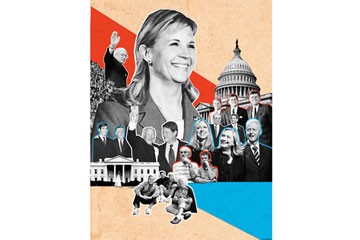
Correction appended July 30, 2013
A few weeks back, Greg Schaefer, a Wyoming coal-company executive who helps lead the state GOP, picked up the phone to hear a fresh voice with a familiar last name. Liz Cheney, the daughter of the former Vice President, was planning to run for the U.S. Senate in a brazen bid to unseat Mike Enzi, a popular conservative who had won three times statewide. "She said it's just time for her to quit sitting on the sidelines and roll up her sleeves," Schaefer remembered. He told Cheney she had her work cut out for her in a state where just about everyone has an opinion about her family pedigree. "I told her it's her best asset," he said. "It's also her worst liability."
Days later, when Cheney, 47, went public with her intentions, her heredity was front and center. "I am running because I believe it is necessary for a new generation of leaders to step up to the plate," she said, alluding to the value of genetic ties to generations before. In fact, Cheney's name is far and away her clearest link to a state with the 10th largest landmass in the U.S. and fewer people than Milwaukee. Born in Wisconsin, Liz Cheney went to school in Wyoming until she was in junior high, when her father became the state's lone Representative and moved the family to Washington. She earned degrees from Colorado College and the University of Chicago Law School. Until she bought a house near Jackson Hole in spring 2012, her career as a State Department official, television pundit and adviser to her father had mainly come to pass while she lived in McLean, Va., a D.C. suburb.
As a result, the Cheney candidacy is shaping up as the latest test of dynastic power in American politics. And the odds are not exactly against her. The U.S. Constitution reads clearly, "No title of nobility shall be granted by the United States," but in a nation that forswore kings, the people have long shown a demonstrable preference for princes and princesses. Legacy candidates have dotted the American political landscape for centuries with names like Adams, Harrison, Taft, Long, Lodge and Kennedy. Even modern political history can be drawn in family trees: the Bayhs of Indiana, the Browns of California, the DeWines of Ohio, the Landrieus of Louisiana, the Pryors of Arkansas and the Udalls, a family with current elected leaders in Colorado, New Mexico and Oregon.
